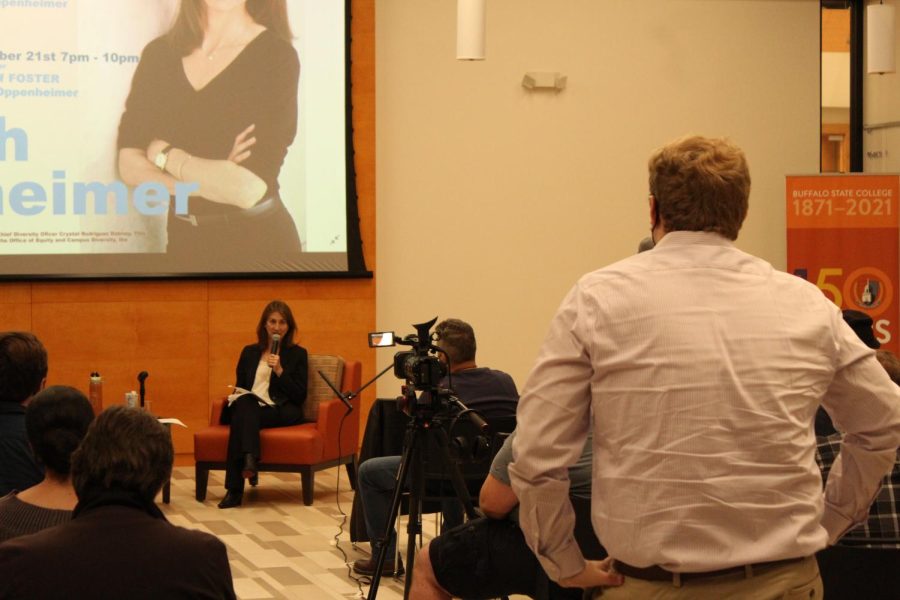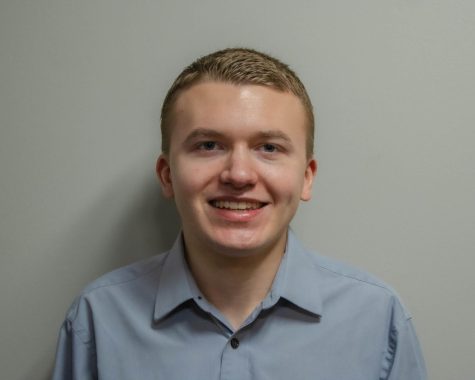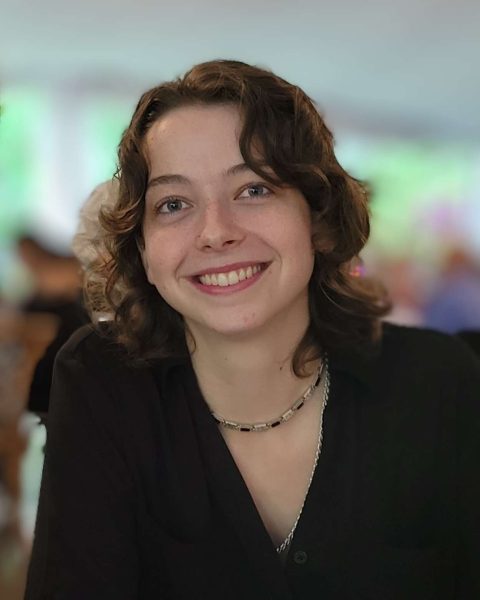HBO documentary ‘Foster’ spotlights the foster care system with many moving stories
Deborah Oppenheimer responds to a student’s question at the Jacqueline Vito LoRusso Alumni & Visitor Center on Thursday, Oct. 21, 2021.
November 1, 2021
Academy Award-winning television and film producer and Buffalo State alumna, Deborah Oppenheimer, returned to campus last week to share her career journey with students, culminating in a screening of her 2018 documentary, “Foster.”
Reunited with writer-director Mark Jonathan Harris – with whom she won her Academy Award with “Into the Arms of Strangers: Stories of the Kindertransport” (2000) – the foster care system in and around Los Angeles is explored in her latest documentary, shedding light on the oft-misunderstood system.
The documentary begins inside the offices of the Los Angeles County Department of Children and Family Services (DCFS), the largest such agency in the U.S., as social workers field calls about children in need of foster home placement. The reasons range from abuse and neglect to parents with drug addictions.
According to the documentary, over 400,000 children makeup the foster care system in the U.S., and around 4 million cases of abuse and neglect are reported to child protection agencies each year. It is a system that is overburdened and generally viewed negatively, a narrative the documentary aims to dispel.
We are first introduced to a woman named Jessica Chandler. Her journey highlights a success story in the foster care system – once a foster child after being placed into the system when her parents divorced when she was 8-years-old, she is now a social worker who helps children experiencing fates similar to hers’.
Introduced next is a charming woman who has been a foster parent for three decades, Earcylene Beavers.
Mrs. Beavers has five foster children – Jake, Denyshia, Sydney, Adrienne and Casi – whose ages range from 8 to 23. Jake has cerebral palsy and has been with Mrs. Beavers since he was 3 and Casi has autism.
A foster family filled with love, compassion and support, it would seem that the children have found their “forever home” with the inimitable Mrs. Beavers – who has fostered over 1,000 children over the last 30 years.
As previously mentioned, the documentary also explores a common problem that necessitates children being placed in the foster care system – parental drug abuse.
In this instance, it revolves around young parents Raeanne and Chris and their baby girl, Kris’Lyn. Kris’Lyn was born after Raeanne tested positive for cocaine, and the story follows the couple’s custody hearing and visits to the hospital where medical tests are performed to determine whether Raeanne’s cocaine use had serious effects on Kris’Lyn.
We are also introduced to Mary, an 18-year-old girl who was abused by her mother and placed into the foster care system at a young age. When asked how many foster homes she has been in, Mary couldn’t give an exact number, only to say it was somewhere around 20.
“Foster” follows her journey through college as she struggles to adapt to the advanced learning environment, something she attributes to being a “drug baby.”
This leads us to Dasani, a 16-year-old boy who has been in and out of group homes since 2014. An example of the effects of instability on foster children’s lives, Dasani’s journey is detailed through his juvenile court hearings.
His relationship with Robert J. Totten, Commissioner of the California Superior Court, is truly unique given the gravity of Dasani’s childhood.
Ultimately, “Foster” does a tremendous job spotlighting just one of the DCFSs within the foster care system, providing a profound look at a system bereft of stability. It truly makes one question how our society has allowed children to endure such tragic upbringings, exemplifying the need for more souls akin to Mrs. Beavers’.
Thus, it is my hope that the reader not only watches this documentary, but perhaps one day seriously considers foster parenting.
“Foster” has certainly inspired me to consider it as I reach a stable position after college, and if the foster care system is to ever shed its negative connotations, we must become a more open-minded and empathetic society.
After all, as Nelson Mandela once said, “There can be no keener revelation of a society’s soul than the way in which it treats its children.”
Watch the documentary here (HBO Max subscription required).





